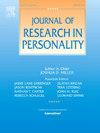A contextualized emotion perception assessment relates to personal and social well-being
IF 2.6
2区 心理学
Q2 PSYCHOLOGY, SOCIAL
引用次数: 0
Abstract
Emotion Recognition Accuracy (ERA) is vital for social functioning and social relationships, yet empirical support for a positive link with well-being has been sparse. In three studies, we show that the Assessment of Contextualized Emotions (ACE) which distinguishes between accurately perceiving intended emotions and bias due to perceiving additional, secondary emotions, consistently predicted personal and social well-being. Across thirteen world cultures, accuracy was associated with higher well-being and life satisfaction, and bias linked to loneliness. A social interaction study in Czech Republic found accuracy (bias) was positively (negatively) associated with social well-being. The effects of accuracy and bias on well-being were partially mediated by social interaction quality in a third study. These findings further our understanding of ERA’s social functions.
求助全文
约1分钟内获得全文
求助全文
来源期刊

Journal of Research in Personality
PSYCHOLOGY, SOCIAL-
CiteScore
5.40
自引率
6.10%
发文量
102
审稿时长
67 days
期刊介绍:
Emphasizing experimental and descriptive research, the Journal of Research in Personality presents articles that examine important issues in the field of personality and in related fields basic to the understanding of personality. The subject matter includes treatments of genetic, physiological, motivational, learning, perceptual, cognitive, and social processes of both normal and abnormal kinds in human and animal subjects. Features: • Papers that present integrated sets of studies that address significant theoretical issues relating to personality. • Theoretical papers and critical reviews of current experimental and methodological interest. • Single, well-designed studies of an innovative nature. • Brief reports, including replication or null result studies of previously reported findings, or a well-designed studies addressing questions of limited scope.
 求助内容:
求助内容: 应助结果提醒方式:
应助结果提醒方式:


